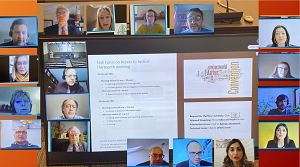
Systemic deficiencies with regard to access to information, decision-making or compliance with environmental law can seriously threaten successful implementation of circular and green economy and sustainable development. Taking a case to court to advance a widely shared public interest remains an essential safeguard for the environment, human health and well-being and sustainable development. The case law in a number of countries demonstrates that environmental non-governmental organizations (NGOs) use a strategic approach to litigation to achieve justice in relation to critical environmental issues such as air quality, biodiversity loss, water quality and climate change. There are clear benefits for countries from promoting enabling conditions for such public interest litigation. Such benefits include protection of environmental rights and accountability in decision-making, improving the quality of environmental assessments and supporting the rule of law.
The Convention on Access to Information, Public Participation in Decision-making and Access to Justice in Environmental Matters (Aarhus Convention) plays a critical role in this regard by assisting Governments and by empowering the public to promote environmental justice.
Representatives of States, judiciary and other review bodies, international and non-governmental organizations, academia and other stakeholders gathered at the thirteenth meeting of the Task Force on Access to Justice under the Aarhus Convention (15 and 16 February 2021), led by Sweden, to share their experiences on public interest litigation and on cases relating to air quality and to information.
With regard to public interest litigation, the key messages derived from the discussion included a call: (a) to remove existing barriers related to costs, access to legal assistance mechanisms, standing, timeliness and appeal procedures; and (b) to promote collective redress in order to remedy environmental damage and ensure compliance with the law relating to the environment.
It was noted that the number of cases related to the content of air quality plans, zonal planning, location of measurement points, diesel car bans and defeat devices, and individual development projects that may have an impact on air quality, has increased. There is also an increased use of citizen science and crowdsourced data to support environmental claims made by the public. The Task Force called on Parties to take additional measures to: (a) establish effective frameworks to support the use of such data; (b) remove barriers to access to justice in such cases; (c) ensure proper enforcement of the legislation relating to air protection, taking into account the close links between air pollution, its effects on human health and the enjoyment of human rights; and (d) ensure the effective implementation of the Aarhus Convention with regard to air quality matters, thereby reducing the demand for access to justice. The implementation of the UNECE Convention on Long-range Transboundary Air Pollution is also instrumental in this regard.
Pursuant to the outcomes of a recent study on access to justice in information cases, Parties were encouraged to promote effective access to justice in information cases, especially with regard to the establishment of information commissioners, timeliness and fairness of existing procedures, access to adequate and effective remedies, execution of the final decisions and the use of mediation.
Representatives of Georgia, Lithuania, Montenegro, the European Commission, the Serbian Information Commissioner, the Supreme Courts of Kazakhstan and of Ukraine, the European Union Forum of Judges for the Environment, and several NGOs, Aarhus Centres and renowned experts shared a number of good practices and challenges in these matters.
Furthermore, key relevant developments were shared by the United Nations Educational, Scientific and Cultural Organization (UNESCO), the United Nations Environment Programme (UNEP), the United Nations Development Programme (UNDP), the office of the Special Rapporteur on Human Rights and the Environment and the Regional Agreement on Access to Information, Public Participation and Justice in Environmental Matters in Latin America and the Caribbean (Escazú Agreement).
Lastly, the Task Force highlighted the need to ensure that access to justice for members of the public is provided effectively, including during the coronavirus disease (COVID-19) pandemic and its subsequent economic recovery phase.
The outcomes of the meeting are expected to strengthen the capacity of governmental officials, members of the judiciary and other review bodies, NGOs and other stakeholders to promote effective access to justice in environmental matters. The meeting was particularly timely, given the ongoing in-depth review of Sustainable Development Goal 16 (peace, justice and strong institutions) and its target 16.3 on promoting the rule of law and ensuring equal access to justice for all at the Regional Forum on Sustainable Development for the UNECE Region (10–18 March 2021) and the high-level political forum on sustainable development (New York, 6–15 July 2021) under the auspices of the Economic and Social Council.
Meeting web page:
Study on access to justice in information cases available at https://unece.org/environment/documents/2021/03/aarhus-tfaj-study-access-justice-information-cases
Aarhus Convention: https://unece.org/environment-policy/public-participation
Convention on Long-range Transboundary Air Pollution: https://unece.org/environment-policy/air
Regional Forum for Sustainable Development for the UNECE Region: https://regionalforum.unece.org/